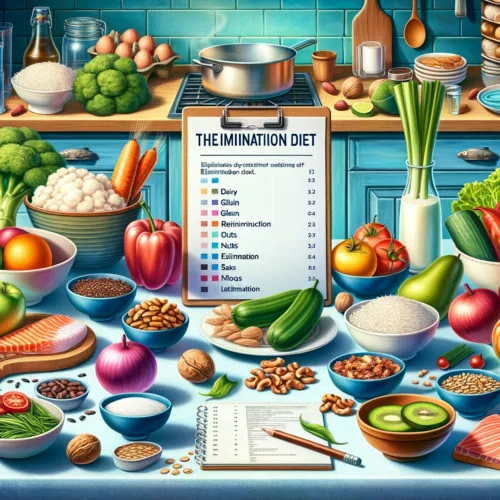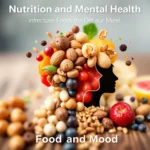Introduction to the Psychology of Nutrition
The psychology of nutrition is a fascinating field of science that explores the complex relationships between our minds and eating behaviors. It encompasses a wide range of questions: from why we choose certain foods to how our taste preferences and eating habits are formed.
At its core, the psychology of nutrition understands that food is not just fuel for our bodies. It is a source of pleasure, a means of socialization, a part of cultural identity, and even a method of emotional regulation. Our food choices are often influenced not only by physiological needs but also by psychological factors.
Understanding the connection between emotions and eating behaviors is critically important for those striving for a healthy lifestyle. By recognizing how our feelings influence food choices, we can learn to better control our eating habits. This knowledge helps us avoid unhealthy patterns, such as stress eating or using food for comfort.
The psychology of nutrition also sheds light on why diets often fail in the long term. Instead of focusing solely on calories and restrictions, this approach teaches us to listen to our bodies, recognize true hunger and fullness, and meet emotional needs in healthy ways that are not related to food.
Emotional Eating: What Is It?
Emotional eating refers to the phenomenon where food is used not to satisfy physical hunger but as a way to cope with emotional states. This behavior can manifest in various ways: from overeating during stress to refusing food in moments of intense anxiety.
The key characteristic of emotional eating is that it is not driven by a physiological need for food. Instead, food becomes a tool for managing emotions—whether to suppress negative feelings or amplify positive ones.
Common triggers for emotional eating include:
1. Work or personal stress: Many people “eat their stress,” especially with high-calorie comfort foods that provide temporary solace.
2. Boredom or loneliness: Food can become a way to “fill the void” or entertain oneself.
3. Relationship conflicts: Some turn to food to cope with the emotional discomfort of arguments or tensions in relationships.
4. Financial problems: Worry about money may lead to cravings for “comfort food.”
5. Fatigue or sleep deprivation: Lack of sleep can disrupt hormonal balance, affecting appetite and leading to overeating.
6. Holidays or social events: Often associated with abundant food, leading to overeating even without hunger.
7. Childhood memories: Certain foods may be associated with pleasant memories, creating a desire for them during sadness or nostalgia.
It is important to recognize these triggers. When you feel the urge to eat, ask yourself: “Am I truly hungry, or is this a reaction to emotions?” This is the first step towards a more mindful approach to eating.
While emotional eating is not always harmful, if it becomes the primary way of dealing with emotions, it can lead to health and weight problems. The psychology of nutrition teaches us to find healthier alternatives for managing emotions, such as physical activity, meditation, or connecting with loved ones.
The Impact of Core Emotions on Food Choices
Our emotions play a significant role in what we choose to eat. The psychology of nutrition helps us understand how different emotional states influence our dietary preferences:
Stress and craving comfort food:
When we are stressed, our bodies release the hormone cortisol, which can increase appetite. In such moments, we often reach for high-calorie, fatty, or sugary foods. This happens because such foods stimulate the production of serotonin and dopamine—neurotransmitters that help us feel better. For example, chocolate or ice cream often become “comfort food” during stressful times.
Happiness and celebratory eating:
In moments of joy and happiness, we tend to choose more diverse foods and often eat more than usual. This is because positive emotions can reduce self-control and increase the desire to “treat ourselves.” Festive meals, delicacies, or favorite treats are often associated with good moods and become a way to prolong pleasant feelings.
Sadness and compulsive overeating:
Feelings of sadness or depression can affect appetite in different ways. Some people lose interest in food, while others begin eating more than usual. Compulsive overeating is often an attempt to “eat away” negative emotions. During these moments, people may choose carbohydrate-rich foods, which temporarily increase serotonin levels and create a sense of comfort.
Anger and impulsive food choices:
Anger and irritation can lead to impulsive eating behaviors. In states of anger, we tend to make less thoughtful choices, often preferring fast food or intensely flavored snacks. This may stem from a desire to quickly gain pleasure or “let off steam” through food. Spicy, salty, or crunchy foods often become the choice during moments of irritation.
Boredom and mindless snacking:
Although boredom is not a basic emotion, it often leads to unhealthy eating behaviors. When bored, we may eat not out of hunger but to occupy ourselves or stimulate the mind. This often results in choosing readily available snacks, even if they are not particularly healthy.
Anxiety and loss of appetite:
Intense anxiety can suppress appetite due to the release of adrenaline, which prepares the body for a “fight or flight” response. However, with chronic anxiety, some people turn to food as a means of self-soothing.
Understanding these links between emotions and food choices is a key aspect of the psychology of nutrition. It helps us become aware of our eating triggers and learn healthier ways to manage emotions. Instead of automatically reacting to emotions with food, we can learn to recognize our feelings and find alternative ways to address them.
The Neurobiology of Eating Behavior

The neurobiology of eating behavior is a captivating area of the psychology of nutrition that examines how our brain influences our dietary habits and preferences. Understanding these processes can help us better control our eating and maintain a healthy weight.
The role of neurotransmitters in forming eating habits:
Neurotransmitters are chemical substances that transmit signals between nerve cells in the brain. They play a key role in regulating appetite and eating behaviors:
1. Serotonin: Often called the “happiness hormone,” serotonin affects mood and appetite. Low levels of serotonin can trigger cravings for carbohydrates since their consumption temporarily raises this neurotransmitter’s levels. This explains why we often reach for sweets or baked goods when feeling sad or stressed.
2. Dopamine: This neurotransmitter is responsible for feelings of pleasure and reward. Tasty food stimulates dopamine release, which can lead to the development of food addictions. This is why it can be so hard to resist favorite treats, even when we know they are unhealthy.
3. Gamma-aminobutyric acid (GABA): This neurotransmitter has a calming effect. Low GABA levels can increase anxiety and stress, potentially leading to emotional overeating.
The connection between emotions and hormones affecting appetite:
Hormones also play a vital role in regulating appetite and eating behaviors:
1. Ghrelin: Known as the “hunger hormone,” ghrelin is produced in the stomach and signals the brain about the need to eat. Interestingly, ghrelin levels increase not only with physical hunger but also during stress, which may explain why we often feel the urge to eat when nervous.
2. Leptin: This “satiety hormone” is produced by fat cells and signals the brain that the body has enough energy. However, in cases of obesity, leptin resistance may develop, preventing the brain from recognizing satiety and leading to overeating.
3. Cortisol: The stress hormone, cortisol, can increase appetite, particularly cravings for sugary and fatty foods. Chronic stress and persistently high cortisol levels may lead to overeating and weight gain.
4. Insulin: This hormone regulates blood sugar levels and influences feelings of hunger and satiety. Insulin imbalances can cause sharp fluctuations in blood sugar levels, resulting in intense hunger and cravings for quick carbohydrates.
Understanding the neurobiology of eating behavior helps us realize that our food habits are not merely a matter of willpower. They are deeply rooted in the biological processes of our bodies. This knowledge can help us be more compassionate towards ourselves and develop more effective strategies for managing our diets.
For instance, knowing how serotonin influences mood and appetite, we can seek healthy ways to increase its levels, such as physical activity or social interaction, instead of turning to unhealthy foods. Understanding dopamine’s role can help us recognize why we struggle to resist certain foods and find alternative sources of pleasure.
Cultural and Social Aspects of Emotional Eating
The psychology of nutrition takes into account not only biological factors but also cultural and social influences, which significantly affect our attitudes toward food and eating behaviors. Understanding these influences can help us become more aware of our eating habits and, if necessary, change them.
The influence of family traditions on eating behaviors:
1. Shaping taste preferences: From an early age, our taste preferences are shaped by what is commonly eaten in our families. If a family eats a lot of fruits and vegetables, a child is more likely to enjoy them in adulthood.
2. Emotional associations with food: Many families use food as a way to express love or provide comfort. For instance, if a child is always treated to sweets when upset, they may continue “eating away” stress with sugary treats as an adult.
3. Attitudes toward food: Family attitudes (e.g., the habit of finishing everything on the plate or strict portion control) can establish long-term eating patterns.
4. Cultural characteristics: In different cultures, food plays different roles. In some, abundant feasts are a sign of hospitality, while in others, moderation in eating is valued.
5. Family rituals: Traditions such as family dinners or holiday feasts can influence how people perceive food in social contexts.
The role of social media in shaping attitudes toward food:
1. Visual appeal of food: Social media is filled with beautiful food photography, which can amplify the desire to try certain dishes or visit specific restaurants.
2. Diet trends: Social media often serves as a platform for spreading various diets and food trends, which can influence food choices and eating patterns.
3. Comparison and self-esteem: Viewing idealized images of bodies and “perfect” diets on social media can impact self-esteem and attitudes toward one’s own body and diet.
4. Information overload: The abundance of often contradictory nutritional information on social media can lead to confusion and anxiety about making the “right” food choices.
5. Social pressure: The popularity of certain diets or products on social media can create a sense of necessity to follow these trends.
6. Advertising and marketing: Social media is a powerful tool for advertising food products, influencing our preferences and choices.
Understanding the cultural and social aspects of emotional eating is essential for developing a healthy relationship with food. Here are some tips for leveraging this knowledge:
- – Reflect on your family’s food traditions. Consider which are beneficial and which might need reevaluation.
- – Be critical of nutritional information on social media. Not everything that looks attractive or popular is truly healthy.
- – Avoid comparing your diet to what you see on social media. Remember that it often presents an idealized picture.
- – Use social media as inspiration for preparing diverse healthy meals, not as a standard to meet.
- – Pay attention to your emotional reactions to food in various social situations. This will help you better understand your relationship with eating.
The psychology of nutrition teaches us that our attitudes toward food are shaped by numerous factors, including family traditions and modern social trends. Recognizing these influences is a crucial step toward a healthier and more balanced approach to eating.
Strategies to Overcome Emotional Eating
The psychology of nutrition offers several effective strategies for overcoming emotional eating. These methods help us better understand and manage our eating habits without resorting to strict diets or limitations.
Developing mindfulness around food:
1. Practice mindful eating: Focus fully on the eating process. Pay attention to the taste, texture, and aroma of your food. Eat slowly, chewing each bite thoroughly.
2. Keep a food diary: Record not only what you eat but also your emotions and circumstances related to eating. This can help identify patterns of emotional eating.
3. Check your hunger: Before eating, ask yourself: “Am I truly hungry, or is this an emotional urge?” Learn to distinguish between physical hunger and emotional needs.
4. Practice gratitude: Take a moment before eating to express gratitude for the food. This helps create a more mindful attitude toward eating.
Stress management techniques without turning to food:
1. Breathing exercises: Deep breathing can quickly reduce stress levels. Try the 4-7-8 technique: inhale for 4 counts, hold your breath for 7 counts, and exhale for 8 counts.
2. Physical activity: Regular exercise helps reduce stress and improve mood. Even a short walk can be effective.
3. Meditation: The practice of meditation calms the mind and reduces the urge for emotional overeating.
4. Hobbies and creativity: Engage in activities you enjoy, such as painting, music, gardening, or any other hobby.
Alternative methods of emotional regulation:
1. Social support: Talking with friends or family can help you cope with negative emotions without turning to food.
2. Journaling: Write down your thoughts and feelings. This helps to better understand your emotions and find alternative ways to deal with them.
3. Relaxation techniques: Try progressive muscle relaxation or yoga to relieve tension.
4. Positive visualization: Imagine a pleasant place or situation when feeling stressed or anxious.
5. Emotional intelligence: Develop the ability to recognize and manage your emotions. This will help you respond to stress more constructively.
6. Self-compassion: Be kind to yourself. Instead of criticizing yourself for emotional eating, try to understand and accept your feelings.
Applying these strategies requires time and patience. Focus on gradual improvements rather than perfection.
The psychology of nutrition teaches us that the key to overcoming emotional eating is not strict control over food but better understanding yourself and your emotional needs. By cultivating mindfulness, managing stress, and finding healthy ways to regulate emotions, you can develop a more harmonious relationship with food and your body.
The Role of Nutrition in Mood Management

The psychology of nutrition highlights the close relationship between what we eat and how we feel. Our diet can significantly affect our mood and emotional state. Understanding this connection helps us use nutrition as a tool for improving mental health and overall well-being.
Foods that enhance mood:
1. Fatty fish (salmon, sardines, mackerel): Rich in omega-3 fatty acids, which are essential for brain health and may help combat depression and anxiety.
2. Dark chocolate: Contains flavonoids that can improve mood. Additionally, chocolate stimulates the production of endorphins—“happiness hormones.”
3. Fermented foods (yogurt, kefir, sauerkraut): Support gut health, which is directly linked to serotonin production—a neurotransmitter responsible for good mood.
4. Nuts and seeds: High in tryptophan, an amino acid needed for serotonin production.
5. Whole grains: Help maintain stable blood sugar levels, supporting consistent energy and mood throughout the day.
6. Fruits and vegetables: Packed with antioxidants and vitamins that support overall brain health and may improve mood.
The impact of diet on mental health:
1. Mediterranean diet: Studies show that this type of eating, rich in vegetables, fruits, whole grains, and healthy fats, can reduce the risk of depression.
2. Balanced nutrition: Regularly consuming a variety of foods ensures the body receives all necessary nutrients, which is essential for maintaining stable mood.
3. Limiting processed foods: High consumption of processed and refined products is associated with an increased risk of depression and anxiety.
4. Hydration: Even mild dehydration can negatively affect mood and cognitive function.
5. Regular meals: Skipping meals or long gaps between eating can cause blood sugar fluctuations, impacting mood.
6. Moderate caffeine intake: While caffeine can temporarily boost mood, excessive consumption may lead to anxiety and sleep disturbances.
7. Limiting alcohol: Although alcohol can temporarily improve mood, regular consumption is linked to an increased risk of depression.
The psychology of nutrition teaches us that food is not just fuel for the body but also an important factor in influencing our emotional state. Here are a few tips to use this knowledge effectively:
- – Include a variety of foods in your diet, especially those known for their positive effects on mood.
- – Pay attention to how different foods affect your well-being. Keep a food and mood diary to identify patterns.
- – Try to eat regularly without skipping meals to maintain stable blood sugar levels.
- – Remember that nutrition is just one factor influencing mood. Combine healthy eating with other methods of supporting mental health, such as physical activity and stress management.
- – If you experience persistent mood issues, seek professional help. Diet can be a helpful complement to treatment but not a replacement for professional care.
Understanding the role of nutrition in mood management is an essential aspect of the psychology of nutrition. This knowledge provides us with an additional tool to support emotional well-being and overall health.
Developing Healthy Eating Habits
The psychology of nutrition emphasizes the importance of building healthy eating habits for long-term well-being. This involves not only choosing the right foods but also creating sustainable behaviors that support health and happiness.
Practical tips for creating a balanced diet:
1. Meal planning: Create a weekly menu in advance. This helps avoid impulsive snacking and ensures variety in your diet.
2. The plate method: Use a simple rule—fill half your plate with vegetables, one-quarter with protein, and one-quarter with complex carbohydrates. This is an easy way to achieve balanced nutrition.
3. Mindful eating: Eat slowly, savoring each bite. This helps you better recognize satiety and avoid overeating.
4. Prepare healthy snacks: Keep cut vegetables, fruits, nuts, or yogurt on hand for healthy snacking between meals.
5. Gradual changes: Instead of drastic dietary restrictions, introduce healthy habits gradually. For example, start by adding one serving of vegetables per day.
6. Reading labels: Learn to understand product ingredients. Pay attention to sugar, salt, and saturated fat content.
7. Cooking at home: Home-cooked meals are generally healthier and allow you to control ingredients and portion sizes.
8. Avoid banning favorite foods: Complete prohibition often leads to binge eating. Instead, enjoy your favorite, less healthy foods in moderation.
The importance of a regular eating schedule:
1. Stabilizing blood sugar levels: Regular meals help maintain stable glucose levels, which is crucial for energy and mood.
2. Preventing overeating: Eating regularly makes you less likely to overeat during the next meal.
3. Boosting metabolism: Regular eating can help speed up metabolism and improve nutrient absorption.
4. Maintaining energy levels: Spreading meals evenly throughout the day helps sustain steady energy.
5. Forming a habit: A consistent eating schedule helps establish a healthy routine that becomes a natural part of your day.
6. Improving digestion: Regular meals support better digestive health.
The psychology of nutrition teaches us that developing healthy eating habits is a process that requires time and patience. Here are a few additional tips:
- – Be kind to yourself. If you slip up and eat something unhealthy, don’t scold yourself. Just return to healthy eating at your next meal.
- – Find support. Share your goals with family or friends, or find like-minded people online.
- – Celebrate small victories. Acknowledge every success, even if it seems minor.
- – Be flexible. Strict rules often lead to setbacks. Allow yourself to deviate from the plan occasionally without feeling guilty.
- – Listen to your body. Learn to distinguish between physical hunger and emotional needs.
- – Experiment with new recipes and foods. This helps make healthy eating enjoyable and varied.
Remember that the goal of forming healthy eating habits is not to achieve “perfect” nutrition but to create a sustainable, enjoyable, and beneficial lifestyle. The psychology of nutrition emphasizes the importance of an individual approach: what works for one person may not work for another. Therefore, it is essential to find your own balance and style of eating that brings you joy and benefits in the long term.
When to Seek Help

The psychology of nutrition acknowledges that sometimes our relationship with food can become complicated or problematic. It is important to recognize the signs of unhealthy eating habits and know when to seek professional help.
Signs of unhealthy relationships with food:
1. Constant thoughts about food or weight: If you find yourself thinking about food, calories, or your weight most of the day, it may indicate a problem.
2. Guilt after eating: Regular feelings of guilt or shame after meals are not normal and could signify unhealthy eating habits.
3. Strict dietary rules: Having rigid rules about what you can and cannot eat, which cause stress or anxiety, may be problematic.
4. Compulsive overeating: Frequently consuming large quantities of food and feeling unable to stop, even when physically full.
5. Secret eating: Eating in private or hiding what and how much you eat from others.
6. Using food as the primary way to cope with emotions: Turning to food as the main source of comfort during stressful situations.
7. Rapid weight fluctuations: Frequent and significant changes in weight can be a sign of unhealthy eating behaviors.
8. Obsession with “healthy” eating: When striving for healthy eating becomes obsessive and interferes with normal life (orthorexia).
The role of psychologists and dietitians in correcting eating behaviors:
1. Psychologist:
- – Helps uncover emotional causes of unhealthy eating behaviors.
- – Works on boosting self-esteem and improving body image.
- – Teaches stress and emotion management techniques that do not involve food.
- – Assists in overcoming obsessive thoughts about food and weight.
- – Addresses family and social factors influencing eating behaviors.
2. Dietitian:
- – Develops an individualized nutrition plan based on physiological needs and preferences.
- – Educates about the basics of healthy eating and creating a balanced diet.
- – Teaches mindful eating skills.
- – Corrects misconceptions about food and diets.
- – Gradually helps establish healthy eating habits.
The most effective approach is often a collaboration between a psychologist and a dietitian, as eating problems usually have both psychological and physiological aspects.
When to seek help:
- – If you notice several of the above signs of an unhealthy relationship with food.
- – If your thoughts about food or weight interfere with daily life or relationships.
- – If you’ve tried to change your eating habits independently but couldn’t achieve sustainable results.
- – If you experience significant stress or anxiety related to food or your body.
- – If you suspect an eating disorder (anorexia, bulimia, or binge eating).
Remember, seeking help is a sign of strength, not weakness. The psychology of nutrition teaches us that a healthy relationship with food is an important part of overall well-being, and professional support may be necessary to achieve it.
Do not hesitate or feel embarrassed to seek help. Many people struggle with eating-related issues, and there are effective ways to address them. Working with specialists can help you not only improve your eating habits but also enhance your quality of life overall.
Conclusion
The psychology of nutrition opens our eyes to the complex and multifaceted nature of our relationship with food. It teaches us that nutrition is not just about consuming calories but an essential part of our emotional and social lives.
Key takeaways:
1. Emotions play a significant role in our food choices and eating behaviors. Stress, happiness, sadness, and anger all influence what and how we eat.
2. Our brain and hormones are closely tied to eating behaviors. Neurotransmitters and hormones affect appetite, satiety, and food preferences.
3. Cultural and social factors, including family traditions and social media, shape our attitudes toward food.
4. Effective strategies to overcome emotional eating include developing mindfulness, managing stress, and finding alternative ways to regulate emotions.
5. Nutrition can significantly impact our mood and mental health. A balanced diet is important not only for physical but also for emotional well-being.
6. Developing healthy eating habits is a process requiring time and patience. Finding an individual approach that works for you is key.
7. Professional help from psychologists and dietitians may be necessary to address eating-related problems.
Encouragement for a mindful approach to food and emotions:
Understanding the psychology of nutrition provides powerful tools for improving our relationship with food and, as a result, our quality of life. Here are some key ideas to embrace:
- – Pay attention to your emotions and how they affect your eating. Learn to distinguish between physical hunger and emotional needs.
- – Develop mindfulness around food. Enjoy the process of eating, noticing the taste, texture, and aroma of your meals.
- – Don’t strive for “perfect” eating. Instead, focus on creating a sustainable, balanced approach to food that brings you joy and health.
- – Be kind to yourself. Remember that slip-ups and mistakes are a normal part of building healthy habits.
- – Use food as a source of nourishment and enjoyment, but not as the main way to manage emotions. Cultivate other strategies for emotional regulation.
- – Don’t hesitate to seek help if your relationship with food becomes problematic.
The psychology of nutrition teaches us that a healthy relationship with food is about balancing enjoyment and care for your health. It’s not about strict rules and restrictions but about building harmonious relationships with food that support your physical and emotional well-being.
Remember, every person is unique, and what works for one may not work for another. Find your own path to healthy eating that considers your individual needs, preferences, and lifestyle.
A mindful approach to food and emotions is a lifelong journey. Be patient with yourself, celebrate small victories, and remember that every step toward healthier eating is a step toward a better quality of life.















